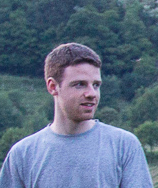Jorge Trojanowski
Research Interest
Cells respond both to the strength and the dynamics of a signal and accordingly make decisions that can affect proliferation, differentiation or cell death. Not only the signal transduction pathways, but also promoters and enhancers of effector genes need to react differentially to the dynamics of a stimulus. Phenomena like transcriptional bursting and promoter refractoriness indicate that there are, indeed, stable promoter states and that they can store memory of past activation events. However, the extent to which transcriptional regulation depends on memory effects, as well as the underlying mechanisms and functional implications are unknown.
We study these questions using transcription reporter systems in live mammalian cells. Light induced recruitment of transcription factors to the reporter gene promoter allows us to record the induction dynamics with good temporal resolution. Besides the precise control of the light stimulus on-set, the reversibility of the transcription factor recruitment makes more complicated stimulation patterns feasible.
In order to investigate dynamic phenomena in transcriptional regulation more deeply we confront recorded time traces with quantitative dynamic models and aim to identify the underlying mechanisms by additional perturbations of chromatin modifiers or transcription machinery components.
Scientific Background
- since 02/2017: PhD student in the research group Chromatin Networks (Karsten Rippe, DKFZ)
- 06/2016 - 12/2016: Master thesis "Quantification and Mechanistic Modelling of Light Induced Transcription to Detect Long Lived Promoter States" in the research group Genome Organization and Function (Karsten Rippe, DKFZ)
- 01/2016 - 03/2016: Research internship "States of Polymerase Priming and Escape in a Model of Refractory Promoter Cycling" (Theoretical Systems Biology, Thomas Höfer, DKFZ)
- 09/2015 - 12/2015: Research internship "Automated Combined FC(C)S and FRAP Measurements in Living Cells" (Cell Biology and Biophysics, Malte Wachsmuth, EMBL Heidelberg)
- 10/2014 - 12/2016: University of Heidelberg - Master program Molecular Biosciences (major: Systems Biology)
- 10/2013 - 03/2014: Bachelor thesis "Nucleosome repositioning and transcriptional response to growth on different carbon sources in Saccharomyces cerevisiae"
- 10/2010 - 03/2014: Ludwig-Maximilian University Munich - Bachelor program Chemistry and Biochemistry
Publications
- Rademacher A, Erdel F, Trojanowski J, Schumacher S, Rippe K. (2017).
Real-time observation of light-controlled transcription in living cells.
J Cell Sci 130(24):4225.
Contact
Jorge Trojanowski
DKFZ & BioQuant Center
Division of Chromatin Networks
Im Neuenheimer Feld 267-BQ24
69120 Heidelberg
Germany
BioQuant room 623
Tel.: +49-6221-54-51374
Fax: +49 6221 54 51487
e-mail: j.trojanowski (at) dkfz-heidelberg.de

